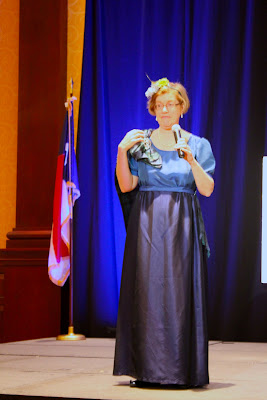
"And so the old years, fraught with memories, die, one after another; and the new years, bright with hopes, are born to take their places..." This line from the final pages of Kate Douglas Wiggin's The Birds' Christmas Carol, which my family reads aloud every Christmas, has always seemed to me to best describe the end-of-year atmosphere. Of course, on December 31st, a day passes, some numbers change, and in many ways it is not worth bothering about. Yet there really is a kind of melancholy about the passing of the old year, and some natural trepidation about the coming of the new one.
I usually make a journal entry of some length every New Year's Eve, chronicling the past year and trying to draw lessons from it wherever possible. This year, it's a blog entry, and I am not going over all the highlights of 2011. Instead, to start, following are some of the lyrics that have been most meaningful to me this twelvemonth.
"I'm takin' my chance on a win
I'm packin' up all my bags
Takin' a mistake I gotta make
Oh, then I am glory bound, mm hmm."
"Let's call her halcyon and hope that she holds,
'Cause every shore she's gonna touch is gonna
turn to solid gold.
She and I been wishin' for a change in our condition
It's not given, but it's obvious to me
There is a world inside the world...that you see."
"And, if you close your eyes,
A river, a silent and beautiful current,
fills you from within, flows forward, darkens you.
Night brings its wetness
to beaches in your soul."
"The lights are much brighter there
You can forget all your troubles,
forget all your cares and go
downtown-- things'll be great when you're
downtown-- no finer place for sure
downtown-- everything's waiting for you"
"I had friends, oh, but not today
Cause they done washed away
They done washed away
And oh, I been cryin'
And oh, I been cryin'
And oh, no more cryin'
No, no more cryin' here...
And I got troubles, oh, but not today
Cause they gonna wash away..."
"I know someday it'll all turn around because
all my life I've been waiting for
I've been praying for
for the people to say
that we don't wanna fight no more
there'll be no more wars
and our children will play
one day"

I was so thankful to be with my family for festivities this year, especially with the passing away of my grandmothers so shortly after I came back to the US. As much as I enjoy, and thrive, living independently, living with family has much to teach about the human condition, that one just can't appreciate when the only person to worry about is oneself.
And as for my grandmothers... I miss them. I will always miss them. But I treasure the time we had together. And I imagine that losing the people we love is what gives us the ability, through detachment, to face death when our own time comes.
I am not resigned to the shutting away of loving hearts in the hard ground.
So it is, and so it will be, for so it has been, time out of mind:
Into the darkness they go, the wise and the lovely.
Crowned with lilies and laurel they go: but I am not resigned.
Lovers and thinkers, into the earth with you.
Be one with the dull, the indiscriminate dust.
A fragment of what you felt, of what you knew,
A formula, a phrase remains- but the best is lost.
The answers quick and keen, the honest look, the laughter, the love-
They are gone. They are gone to feed the roses. Elegant and curled
Is the blossom. Fragrant is the blossom. I know. But I do not approve.
More precious was the light in your eyes than all the roses in the world.
Down, down, down into the darkness of the grave
Gently they go, the beautiful, the tender, the kind;
Quietly they go, the intelligent, the witty, the brave.
I know. But I do not approve. And I am not resigned.
(Dirge Without Music, Edna St. Vincent Millay)

To make an honest evaluation, I'd say I did one heck of a job keeping everything together in 2011. But it won't be enough for 2012. This new year will demand more courage, better organization, deeper commitment, truer friendship, stronger love, higher hope, and greater faith.
It will be quite a year, no doubt filled with events I can't predict; some pleasant, others difficult. That's life.
As for my hopes for 2012, foremost is finding and making the best friend with whom I can share my life. (I don't intend to make any uninformed or hasty decisions, and I am not going to settle. But this is my highest hope. I have no wish to be always alone.) Other hopes are for greater familiarity with the Twin Cities and the friends I have here, continuing friendship with friends overseas, a trip to Japan, improving physical fitness, deciding on a next step, and finishing the 3rd-6th seasons of LOST so I can finally get on with my life. :) Also, I would like to see Ron Paul get in and shake up the status quo. There is no perfect candidate, but if anyone can bring real change in what I believe to be a positive direction, it's Paul.

Happy New Year, everybody!














































